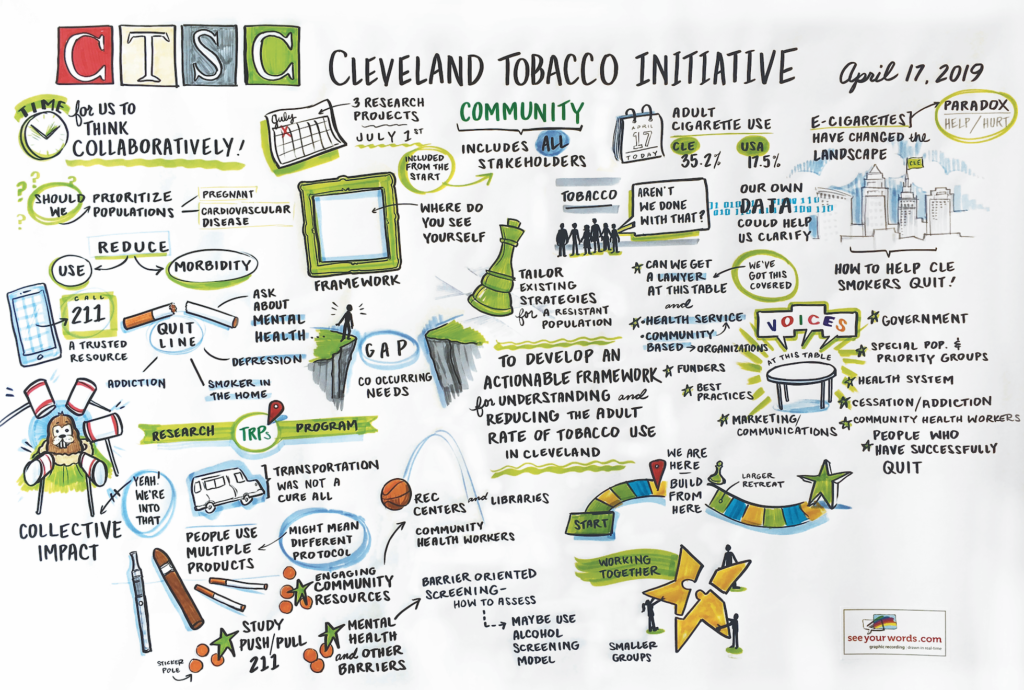The Smoking Cessation Among Low-Income Cleveland Residents Pilot Study is part of a larger, multi-investigator and stakeholder initiative aimed at reducing the tobacco use in Cleveland, which in turn will help to reduce cancer risk across the city.
Why is this important to our community?
Across the city of Cleveland where the median income is $26,179, adult tobacco use was 38.6% in 2015. This is more than twice the national rate of 17.5%. Cleveland provides a natural environment to better understand the barriers to smoking cessation among low-income individuals. This allows us to develop and test intervention strategies that are scalable and replicable in other contexts, ultimately contributing to a reduction in tobacco use nationally. Identifying approaches to best intervene with and to support low-income smokers as they seek to quit smoking is a critical research priority.

Team Members & Collaborators
PRCHN Team
-
- Erika Trapl- Principal Investigator
- Elaine Borawski – Principal Investigator
- Sarah Koopman Gonzalez – Co- Investigator
- Jin Kim-Mozeleski – Research Collaborator
- Catherine Osborn – Research Coordinator
- Casey Albitz – Graduate Research Assistant
- Elizabeth Frost – Research Coordinator
Collaborators & Partners
-
- Various food pantries within Hunger Network of Greater Cleveland
- Northeast Ohio Neighborhood (NEON) Clinic
- Other Community Partners
Advisory Board
-
- The Breathe Free Committee was established by Healthy Cleveland, an initiative of the Cleveland Department of Public Health. The committee consists of community partners from across Cleveland including Metro Health, University Hospitals, Cleveland Clinic, Cleveland Department of Public Health, American Heart Association, American Lung Association, Preventing Tobacco Addiction Foundation, Case Comprehensive Cancer Center, Tobacco Free Kids, and others.
Communities of Focus
Neighborhoods throughout Cleveland, OH.
Project Activities
The Smoking Cessation Among Low-Income Cleveland Residents Pilot Study consists of two complimentary projects. Project 1 is known as the CWRU Tobacco Interview Study and Project 2 is referred to as the 2-1-1 Smoking Cessation Study.
- Project 1: CWRU Tobacco Interview Study
- Qualitative interviews were conducted with current smokers and former smokers who have quit in the past three years. We recruited individuals who fit into either of these categories.
- Project 2: 2-1-1 Smoking Cessation Study
- Part 1- Qualitative interviews were conducted with individuals who have called 2-1-1 United Way of Greater Cleveland for information pertaining to smoking cessation services.
- Part 2- Interviews have already been conducted with Call Navigation Specialists who work for 2-1-1 United Way of Greater Cleveland answering phone calls and providing referrals to individuals looking for smoking cessation services.
- Part 3- Audits will be done to examine recorded phone calls to 2-1-1 where an individual had called looking for tobacco cessation services.
Specific Aims 
- Project 1:
- Aim 1- Establish a steering committee
- Aim 2- Implement an ethnographic study of low income current and former smokers
- Aim 3- Develop a comprehensive plan to curb tobacco use in Cleveland
- Project 2:
- Aim 1- Conduct qualitative interviews with 2-1-1 callers
- Aim 2- Conduct qualitative interviews with 2-1-1 Call Navigation Specialists
- Aim 3- Perform audits of 2-1-1 smoking cessation calls
Timeline
The Smoking Cessation Among Low-Income Cleveland Residents Pilot Study began in August 2019 and will end on December 2020.
Dissemination
Findings from this study will be disseminated through the Breathe Free Committee and other community partners when the study is concluded.
What’s Next?
We will continue recruiting for both projects, doing data analysis and disseminating findings. We hope this project will provide data on how best to address the high use of tobacco use in Cleveland. It is a pilot project meaning that future interventions will be formed from the findings.
For more information about this project, please contact Elizabeth Frost
